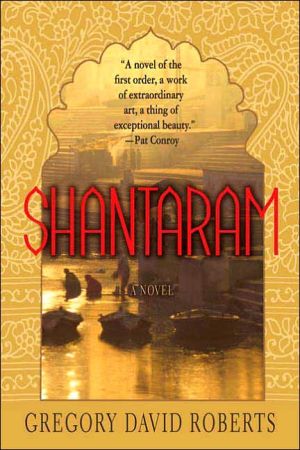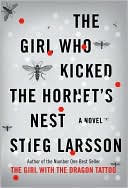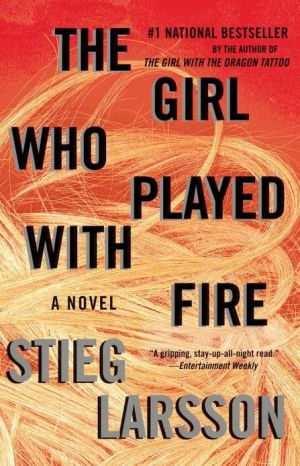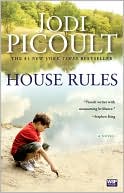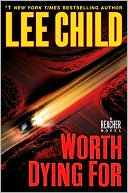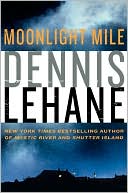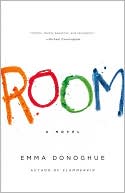Shantaram
"It took me a long time and most of the world to learn what I know about love and fate and the choices we make, but the heart of it came to me in an instant, while I was chained to a wall and being tortured."\ So begins this epic, mesmerizing first novel set in the underworld of contemporary Bombay. Shantaram is narrated by Lin, an escaped convict with a false passport who flees maximum security prison in Australia for the teeming streets of a city where he can disappear.\ Accompanied by his...
Search in google:
"It took me a long time and most of the world to learn what I know about love and fate and the choices we make, but the heart of it came to me in an instant, while I was chained to a wall and being tortured."So begins this epic, mesmerizing first novel set in the underworld of contemporary Bombay. Shantaram is narrated by Lin, an escaped convict with a false passport who flees maximum security prison in Australia for the teeming streets of a city where he can disappear.Accompanied by his guide and faithful friend, Prabaker, the two enter Bombay's hidden society of beggars and gangsters, prostitutes and holy men, soldiers and actors, and Indians and exiles from other countries, who seek in this remarkable place what they cannot find elsewhere.As a hunted man without a home, family, or identity, Lin searches for love and meaning while running a clinic in one of the city's poorest slums, and serving his apprenticeship in the dark arts of the Bombay mafia. The search leads him to war, prison torture, murder, and a series of enigmatic and bloody betrayals. The keys to unlock the mysteries and intrigues that bind Lin are held by two people. The first is Khader Khan: mafia godfather, criminal-philosopher-saint, and mentor to Lin in the underworld of the Golden City. The second is Karla: elusive, dangerous, and beautiful, whose passions are driven by secrets that torment her and yet give her a terrible power.Burning slums and five-star hotels, romantic love and prison agonies, criminal wars and Bollywood films, spiritual gurus and mujaheddin guerrillas—-this huge novel has the world of human experience in its reach, and a passionate love for India at its heart. Based on the life of the author, it is by any measure the debut of an extraordinary voice in literature.USA Today - Rita BishnoiPart travelogue, part love letter, part autobiography, Shantaram is a vivid, entertaining but slightly grandiose tale of Lin, an ex-junkie and convicted robber who escapes from an Australian prison then hides in the most alien of places: the hot, filthy, decadent, seaside metropolis of Bombay.
SHANTARAM\ \ By Gregory David Roberts \ St. Martin's Press\ Copyright © 2003 Gregory David Roberts\ All right reserved.\ ISBN: 0-312-33052-9 \ \ \ Chapter One\ It took me a long time and most of the world to learn what I know about love and fate and the choices we make, but the heart of it came to me in an instant, while I was chained to a wall and being tortured. I realised, somehow, through the screaming in my mind, that even in that shackled, bloody helplessness, I was still free: free to hate the men who were torturing me, or to forgive them. It doesn't sound like much, I know. But in the flinch and bite of the chain, when it's all you've got, that freedom is a universe of possibility. And the choice you make, between hating and forgiving, can become the story of your life. \ In my case, it's a long story, and a crowded one. I was a revolutionary who lost his ideals in heroin, a philosopher who lost his integrity in crime, and a poet who lost his soul in a maximum-security prison. When I escaped from that prison, over the front wall, between two gun-towers, I became my country's most wanted man. Luck ran with me and flew with me across the world to India, where I joined the Bombay mafia. I worked as a gunrunner, a smuggler, and a counterfeiter. I was chained on three continents, beaten, stabbed, and starved. I went to war. I ran into the enemy guns. And I survived, while other men around me died. They were better men than I am, most of them: better men whose lives were crunched up in mistakes, and thrown away by the wrong second of someone else's hate, or love, or indifference. And I buried them, too many of those men, and grieved their stories and their lives into my own.\ But my story doesn't begin with them, or with the mafia: it goes back to that first day in Bombay. Fate put me in the game there. Luck dealt the cards that led me to Karla Saaranen. And I started to play it out, that hand, from the first moment I looked into her green eyes. So it begins, this story, like everything else-with a woman, and a city, and a little bit of luck.\ The first thing I noticed about Bombay, on that first day, was the smell of the different air. I could smell it before I saw or heard anything of India, even as I walked along the umbilical corridor that connected the plane to the airport. I was excited and delighted by it, in that First Bombay minute, escaped from prison and new to the wide world, but I didn't and couldn't recognise it. I know now that it's the sweet, sweating smell of hope, which is the opposite of hate; and it's the sour, stifled smell of greed, which is the opposite of love. It's the smell of gods, demons, empires, and civilisations in resurrection and decay. It's the blue skin-smell of the sea, no matter where you are in the Island City, and the blood-metal smell of machines. It smells of the stir and sleep and waste of sixty million animals, more than half of them humans and rats. It smells of heartbreak, and the struggle to live, and of the crucial failures and loves that produce our courage. It smells of ten thousand restaurants, five thousand temples, shrines, churches, and mosques, and of a hundred bazaars devoted exclusively to perfumes, spices, incense, and freshly cut flowers. Karla once called it the worst good smell in the world, and she was right, of course, in that way she had of being right about things. But whenever I return to Bombay, now, it's my first sense of the city-that smell, above all things-that welcomes me and tells me I've come home.\ The next thing I noticed was the heat. I stood in airport queues, not five minutes from the conditioned air of the plane, and my clothes clung to sudden sweat. My heart thumped under the command of the new climate. Each breath was an angry little victory. I came to know that it never stops, the jungle sweat, because the heat that makes it, night and day, is a wet heat. The choking humidity makes amphibians of us all, in Bombay, breathing water in air; you learn to live with it, and you learn to like it, or you leave.\ Then there were the people. Assamese, Jats, and Punjabis; people from Rajasthan, Bengal, and Tamil Nadu; from Pushkar, Cochin, and Konarak; warrior caste, Brahmin, and untouchable; Hindu, Muslim, Christian, Buddhist, Parsee, Jain, Animist; fair skin and dark, green eyes and golden brown and black; every different face and form of that extravagant variety, that incomparable beauty, India.\ All the Bombay millions, and then one more. The two best friends of the smuggler are the mule and the camel. Mules carry contraband across a border control for a smuggler. Camels are unsuspecting tourists who help the smuggler to get across the border. To camouflage themselves, when using false passports and identification papers, smugglers insinuate themselves into the company of fellow travellers-camels, who'll carry them safely and unobtrusively through airport or border controls without realising it.\ I didn't know all that then. I learned the smuggling arts much later, years later. On that first trip to India I was just working on instinct, and the only commodity I was smuggling was my self, my fragile and hunted freedom. I was using a false New Zealand passport, with my photograph substituted in it for the original. I'd done the work myself, and it wasn't a perfect job. I was sure it would pass a routine examination, but I knew that if suspicions were aroused, and someone checked with the New Zealand High Commission, it would be exposed as a forgery fairly quickly. On the journey to India from Auckland, I'd roamed the plane in search of the right group of New Zealanders. I found a small party of students who were making their second trip to the sub-continent. Urging them to share their experience and travellers' tips with me, I fostered a slender acquaintance with them that brought us to the airport controls together. The various Indian officials assumed that I was travelling with that relaxed and guileless group, and gave me no more than a cursory check.\ I pushed through alone to the slap and sting of sunlight outside the airport, intoxicated with the exhilaration of escape: another wall scaled, another border crossed, another day and night to run and hide. I'd escaped from prison almost two years before, but the fact of the fugitive life is that you have to keep on escaping, every day and every night. And while not completely free, never completely free, there was hope and fearful excitement in the new: a new passport, a new country, and new lines of excited dread on my young face, under the grey eyes. I stood there on the trample street, beneath the baked blue bowl of Bombay sky, and my heart was as clean and hungry for promises as a monsoon morning in the gardens of Malabar.\ 'Sir! Sir!' a voice called from behind me.\ A hand grabbed at my arm. I stopped. I tensed every fighting muscle, and bit down on the fear. Don't run. Don't panic. I turned.\ A small man stood before me, dressed in a grimy brown uniform, and carrying my guitar. More than small, he was a tiny man, a dwarf, with a large head, and the startled innocence of Down syndrome in his features. He thrust the guitar at me.\ 'Your music, sir. You are losing your music, isn't it?'\ It was my guitar. I realised at once that I must've forgotten it near the baggage carousel. I couldn't guess how the little man had known that it belonged to me. When I smiled my relief and surprise, the man grinned back at me with that perfect sincerity we fear and call simple-minded. He passed the guitar to me, and I noticed that his hands were webbed like the feet of a wading bird. I pulled a few notes from my pocket and offered them to him, but he backed away awkwardly on his thick legs.\ 'Not money. We are here to help it, sir. Welcome in India,' he said, and trotted away into the forest of bodies on the path.\ I bought a ticket to the city with the Veterans' Bus Service, manned by ex-servicemen from the Indian army. I watched as my backpack and travel bag were lifted to the top of a bus, and dumped onto a pile of luggage with precise and nonchalant violence, and decided to keep the guitar in my hands. I took a place on the bench seat at the back of the bus, and was joined there by two long-haired travellers. The bus filled quickly with a mix of Indians and foreigners, most of them young, and travelling as inexpensively as possible.\ When the bus was close to full, the driver turned in his seat, scowled at us menacingly, spat a jet of vivid red betel juice through the open doorway, and announced our imminent departure.\ 'Thik hain, challo!'\ The engine roared, gears meshed with a growl and thunk, and we sped off at alarming speed through crowds of porters and pedestrians who limped, sprang, or side-stepped out of the way with only millimetres to spare. Our conductor, riding on the bottom step of the bus, cursed them with artful animosity.\ The journey from the airport to the city began on a wide, modern motorway, lined with shrubs and trees. It was much like the neat, pragmatic landscape that surrounded the international airport in my home city, Melbourne. The familiarity lulled me into a complacency that was so profoundly shattered, at the first narrowing of the road, that the contrast and its effect seemed calculated. For the first sight of the slums, as the many lanes of the motorway became one, and the trees disappeared, clutched at my heart with talons of shame.\ Like brown and black dunes, the acres of slums rolled away from the roadside, and met the horizon with dirty heat-haze mirages. The miserable shelters were patched together from rags, scraps of plastic and paper, reed mats, and bamboo sticks. They slumped together, attached one to another, and with narrow lanes winding between them. Nothing in the enormous sprawl of it rose much above the height of a man.\ It seemed impossible that a modern airport, full of prosperous and purposeful travellers, was only kilometres away from those crushed and cindered dreams. My first impression was that some catastrophe had taken place, and that the slums were refugee camps for the shambling survivors. I learned, months later, that they were survivors, of course, those slum-dwellers: the catastrophes that had driven them to the slums from their villages were poverty, famine, and bloodshed. And five thousand new survivors arrived in the city every week, week after week, year after year.\ As the kilometres wound past, as the hundreds of people in those slums became thousands, and tens of thousands, my spirit writhed. I felt defiled by my own health and the money in my pockets. If you feel it at all, it's a lacerating guilt, that first confrontation with the wretched of the earth. I'd robbed banks, and dealt drugs, and I'd been beaten by prison warders until my bones broke. I'd been stabbed, and I'd stabbed men in return. I'd escaped from a hard prison full of hard men, the hard way-over the front wall. Still, that first encounter with the ragged misery of the slum, heartbreak all the way to the horizon, cut into my eyes. For a time, I ran onto the knives.\ Then the smoulders of shame and guilt flamed into anger, became fist-tightening rage at the unfairness of it: What kind of a government, I thought, what kind of a system allows suffering like this?\ But the slums went on, kilometre after kilometre, relieved only by the awful contrast of the thriving businesses and crumbling, moss-covered apartment buildings of the comparatively affluent. The slums went on, and their sheer ubiquity wore down my foreigner's pieties. A kind of wonder possessed me. I began to look beyond the immensity of the slum societies, and to see the people who lived within them. A woman stooped to brush forward the black satin psalm of her hair. Another bathed her children with water from a copper dish. A man led three goats with red ribbons tied to the collars at their throats. Another man shaved himself at a cracked mirror. Children played everywhere. Men carried water in buckets. Men made repairs to one of the huts. And everywhere that I looked, people smiled and laughed.\ The bus stopped in a stutter of traffic, and a man emerged from one of the huts near my window. He was a foreigner, as pale-skinned as any of the new arrivals on the bus, and dressed only in a wrap-around sheet of hibiscus-patterned cotton. He stretched, yawned, and scratched unself-consciously at his naked belly. There was a definitive, bovine placidity in his face and posture. I found myself envying that contentment, and the smiles of greeting he drew from a group of people who walked past him to the road.\ The bus jerked into motion once more, and I lost sight of the man. But that image of him changed everything in my attitude to the slums. Seeing him there, a man as alien to the place as I was, let me picture myself in that world. What had seemed unimaginably strange and remote from my experience suddenly became possible, and comprehensible, and, finally, fascinating.\ I looked at the people, then, and I saw how busy they were-how much industry and energy described their lives. Occasional sudden glimpses inside the huts revealed the astonishing cleanliness of that poverty: the spotless floors, and glistening metal pots in neat, tapering towers. And then, last, what should've been first, I saw how beautiful they were: the women wrapped in crimson, blue, and gold; the women walking barefoot through the tangled shabbiness of the slum with patient, ethereal grace; the white-toothed, almond-eyed handsomeness of the men; and the affectionate camaraderie of the fine-limbed children, older ones playing with younger ones, many of them supporting baby brothers and sisters on their slender hips. And half an hour after the bus ride began, I smiled for the first time.\ 'It ain't pretty,' the young man beside me said, looking at the scene beyond the window. He was Canadian, the maple leaf patch on his jacket declared: tall and heavy-set, with pale eyes, and shoulder-length brown hair. His companion looked like a shorter, more compact version of himself; they even wore identical stonewashed jeans, sandals, and soft, calico jackets.\ 'Come again?'\ 'This your first time?' he asked in reply. I nodded. 'I thought so. Don't worry. From here on, it gets a little better. Not so many slums and all. But it ain't good anywheres in Bombay. This here is the crummiest city in India, y'can take my word.'\ 'You got that right,' the shorter man agreed.\ 'But from here on in, you got a couple nice temples and some big British buildings that are okay-stone lions and brass street lights and like that. But this ain't India. The real India is up near the Himalayas, at Manali, or at the holy city of Varanasi, or down the coast, at Kerala. You gotta get outta the city to fred the real India.'\ 'Where are you guys headed?'\ 'We're going to stay at an ashram,' his friend announced. 'It's run by the Rajneeshis, at Poona. It's the best ashram in the country.'\ \ Continues...\ \ \ \ Excerpted from SHANTARAM by Gregory David Roberts Copyright © 2003 by Gregory David Roberts. Excerpted by permission.\ All rights reserved. No part of this excerpt may be reproduced or reprinted without permission in writing from the publisher.\ Excerpts are provided by Dial-A-Book Inc. solely for the personal use of visitors to this web site. \ \
\ From the Publisher"Shantaram is a novel of the first order, a work of extraordinary art, a thing of exceptional beauty. If someone asked me what the book was about, I would have to say everything, every thing in the world. Gregory David Roberts does for Bombay what Lawrence Durrell did for Alexandria, what Melville did for the South Seas, and what Thoreau did for Walden Pond: He makes it an eternal player in the literature of the world."- Pat Conroy\ "Shantaram has provided me with the richest reading experience to date and I don't expect anybody to unseat its all-round performance for a long time. It is seductive, powerful, complex, and blessed with a perfect voice. Like a voodoo ghost snatcher, Gregory David Roberts has captured the spirits of the likes of Henri Charrière, Rohinton Mistry, Tom Wolfe, and Mario Vargas Llosa, fused them with his own unique magic, and built the most gripping monument in print. The land of the god Ganesh has unchained the elephant, and with the monster running amok, I tremble for the brave soul dreaming of writing a novel about India. Gregory David Roberts is a suitable giant, a dazzling guru, and a genius in full." - Moses Isegawa, author of Abyssinian Chronicles and Snakepit\ "Shantaram is, quite simply, the 1001 Arabian Nights of the new century. Anyone who loves to read has been looking for this book all their reading life. Anyone who walks away from Shantaram untouched is either heartless or dead or both. I haven't had such a wonderful time in years."- Jonathan Carroll, author of White Apples\ "Shantaram is dazzling. More importantly, it offers a lesson...that those we incarcerate are human beings. They deserve to be treated with dignity. Some of them, after all, may be exceptional. Some may even possess genius."- Ayelet Waldman, author of Crossing the Park"Utterly unique, absolutely audacious, and wonderfully wild, Shantaram is sure to catch even the most fantastic of imaginations off guard."—-Elle"Shantaram had me hooked from the first sentence. [It] is thrilling, touching, frightening...a glorious wallow of a novel."—-Detroit Free Press"[A] sprawling, intelligent novel…full of vibrant characters…the exuberance of his prose is refreshing…Roberts brings us through Bombay's slums and opium houses, its prostitution dens and ex-pat bars, saying, You come now. And we follow."—-The Washington Post\ "Inspired storytelling."—People"Vivid, entertaining. Its visceral, cinematic descriptive beauty truly impresses."—USA Today"Few stand out quite like Shantaram …nothing if not entertaining. Sometimes a big story is its own best reward."—The New York Times\ "...very good...vast of vision and breadth."—Time Out\ "This massive autobiographical novel draws heavily from Roberts' vida loca. Don't let the size scare you away - Shantaram is one of the most gripping tales of personal redemption you'll ever read."—Giant Magazine\ "This reviewer is amazed that Roberts is here to write anything. Swallowed up by the abyss, somehow he crawled out intact….His love for other people was his salvation…Powerful books can change our lives. The potency of Shantaram is the joy of forgiveness. First we must regret, then forgive. Forgiveness is a beacon in the blackness." —Dayton Daily News\ " Shantaram is loads of colorful fun, [it] rises to something grand in its evocations of the pungent chaos of Bombay. "—Minneapolis Star Tribune"Shantaram is a true epic. It is a huge, messy, over-the-top irresistible shaggy-dog story."—The Seattle Times\ \ \ \ \ \ Rita BishnoiPart travelogue, part love letter, part autobiography, Shantaram is a vivid, entertaining but slightly grandiose tale of Lin, an ex-junkie and convicted robber who escapes from an Australian prison then hides in the most alien of places: the hot, filthy, decadent, seaside metropolis of Bombay.\ — USA Today\ \ \ Megan O'GradyA gentle giant on the scale of Shantaram can afford a few unintended giggles, but million-rupee questions remain: Why, given Roberts's wealth of material and penchant for soul-searching, didn't he write a memoir? And what of Linbaba's debt to society and, presumably, to his briefly mentioned young daughter back in Australia? What is he really after, anyway? But it seems unsporting to begrudge Roberts the license to thrill while having such a good time -- and Shantaram, mangrove-scented prose and all, is nothing if not entertaining. Sometimes a big story is its own best reward. And there's always the next installment.\ — The New York Times\ \ \ \ \ Publishers WeeklyAt the start of this massive, thrillingly undomesticated potboiler, a young Australian man bearing a false New Zealand passport that gives his name as "Lindsay" flies to Bombay some time in the early '80s. On his first day there, Lindsay meets the two people who will largely influence his fate in the city. One is a young tour guide, Prabaker, whose gifts include a large smile and an unstoppably joyful heart. Through Prabaker, Lindsay learns Marathi (a language not often spoken by gora, or foreigners), gets to know village India and settles, for a time, in a vast shantytown, operating an illicit free clinic. The second person he meets is Karla, a beautiful Swiss-American woman with sea-green eyes and a circle of expatriate friends. Lin's love for Karla and her mysterious inability to love in return gives the book its central tension. "Linbaba's" life in the slum abruptly ends when he is arrested without charge and thrown into the hell of Arthur Road Prison. Upon his release, he moves from the slum and begins laundering money and forging passports for one of the heads of the Bombay mafia, guru/sage Abdel Khader Khan. Eventually, he follows Khader as an improbable guerrilla in the war against the Russians in Afghanistan. There he learns about Karla's connection to Khader and discovers who set him up for arrest. Roberts, who wrote the first drafts of the novel in prison, has poured everything he knows into this book and it shows. It has a heartfelt, cinemascope feel. If there are occasional passages that would make the very angels of purple prose weep, there are also images, plots, characters, philosophical dialogues and mysteries that more than compensate for the novel's flaws. A sensational read, it might well reproduce its bestselling success in Australia here. Agent, Joe Regal Literary. (Oct. 18) Forecast: This is a novel with electric appeal, heightened by Roberts's exotic backstory (see q&a, p. 36). There should be plenty of media interest in the book and its author, and its sheer heft will make it stand out in bookstores. Copyright 2004 Reed Business Information.\ \ \ \ \ Library JournalHaving ditched his revolutionary ideals for heroin, our narrator ends up imprisoned in Australia, then escapes to an evidently vividly depicted Bombay to smuggle drugs and arms. What's really scary is that Roberts has based his first novel on personal experience. Copyright 2004 Reed Business Information.\ \ \ \ \ Kirkus Reviews"The truth is, the man I am was born in those moments, as I stood near the flood sticks with my face lifted to the chrismal rain": an elegantly written, page-turning blockbuster by Australian newcomer Roberts. The story is taken from Roberts's own life: an Australian escapes from prison (he committed armed robbery to support heroin addiction) and flees to Mumbai (here, Bombay), where, hiding in the slums, he finds himself becoming at once increasingly Christlike and increasingly drawn into the criminal demimonde. The narrator, Lin, now going by Shantaram Kishan Kharre, takes to healing the sick while learning the ways of India's poor through the good offices of a guide named Pribaker, who's a little shady and more than a little noble, and through the booze-fogged lens provided by dodgy Eurotrash expats like aging French bad boy Didier, who "spoke a lavishly accented English . . . to provoke and criticize friend and stranger alike with an indolent malignity." Measuring their lives in the coffeespoons of one monsoon season to the next, these characters work in the orbit of fabulous crimelords and their more actively malign lieutenants, all with murky connections to the drug trade, Bollywood, and foreign intelligence agencies (as one tells our narrator, "All the secret police of the world work together, Lin, and that is their biggest secret"). Violence begets violence, the afflicted are calmed and balmed, friends are betrayed, people are killed, prison doors are slammed shut, then opened by well-greased palms. It's an extraordinarily rich scene befitting Les Miserables, a possible influence here, or another less obvious but just as philosophically charged ancestor, James Michener's TheDrifters. Roberts is a sure storyteller, capable of passages of precise beauty, and if his tale sometimes threatens to sprawl out of bounds and collapse under its own bookish, poetic weight, he draws its elements together at just the right moment. A roman-a-clef rejoinder to Suketu Mehta's Maximum City (p. 676), splendidly evoking an India few outsiders know. Agent: Jenny Darling/Jenny Darling & Associates, Australia\ \ \ \ \ Moses Isegawa"Shantaram has provided me with the richest reading experience to date and I don't expect anybody to unseat its all-round performance for a long time. It is seductive, powerful, complex, and blessed with a perfect voice. Like a voodoo ghost snatcher, Gregory David Roberts has captured the spirits of the likes of Henri Charrière, Rohinton Mistry, Tom Wolfe, and Mario Vargas Llosa, fused them with his own unique magic, and built the most gripping monument in print. The land of the god Ganesh has unchained the elephant, and with the monster running amok, I tremble for the brave soul dreaming of writing a novel about India. Gregory David Roberts is a suitable giant, a dazzling guru, and a genius in full.\ \ \ \ \ Jonathan Carroll"Shantaram is, quite simply, the 1001 Arabian Nights of the new century. Anyone who loves to read has been looking for this book all their reading life. Anyone who walks away from Shantaram untouched is either heartless or dead or both. I haven't had such a wonderful time in years.\ \ \ \ \ Ayelet Waldman"Shantaram is dazzling. More importantly, it offers a lesson…that those we incarcerate are human beings. They deserve to be treated with dignity. Some of them, after all, may be exceptional. Some may even possess genius.\ \ \ \ \ Pat Conroy"Shantaram is a novel of the first order, a work of extraordinary art, a thing of exceptional beauty. If someone asked me what the book was about, I would have to say everything, every thing in the world. Gregory David Roberts does for Bombay what Lawrence Durrell did for Alexandria, what Melville did for the South Seas, and what Thoreau did for Walden Pond: He makes it an eternal player in the literature of the world.\ \
